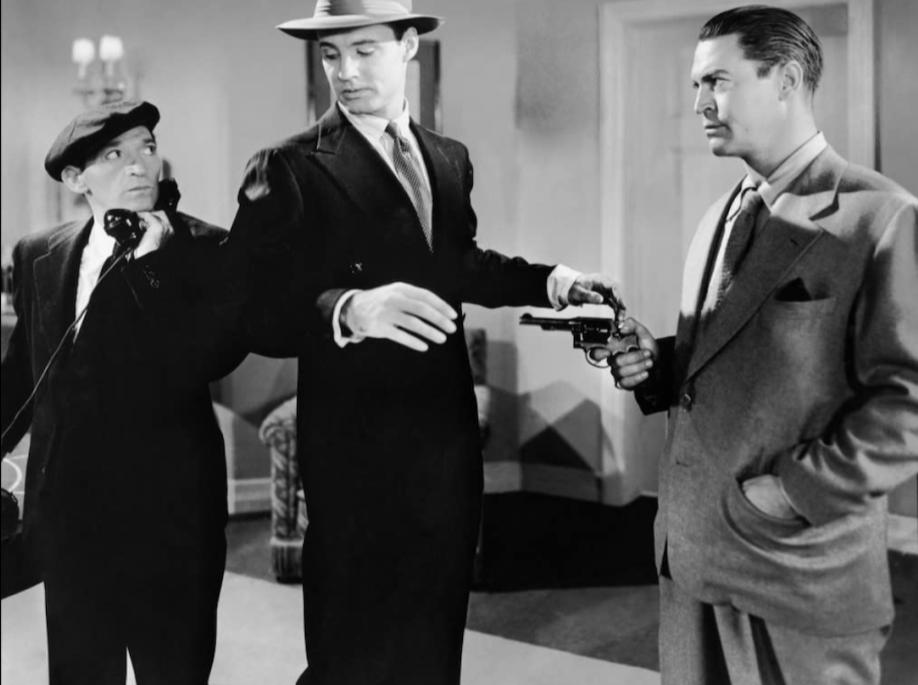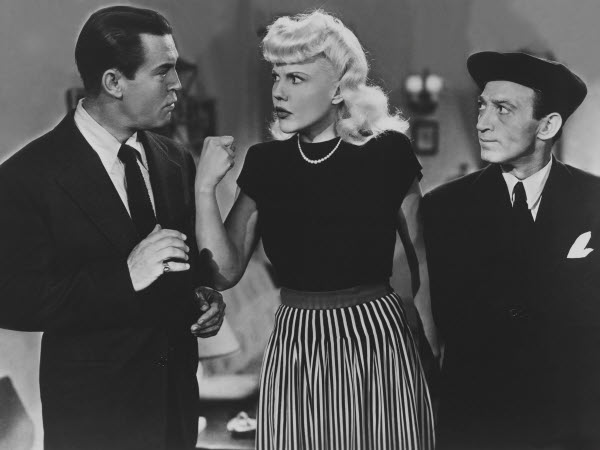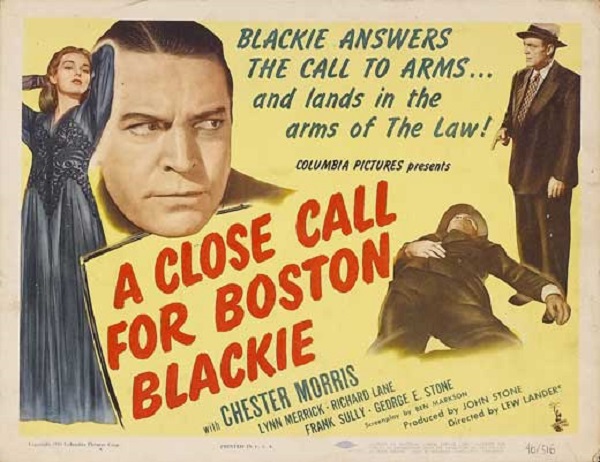Review: A Close Call for Boston Blackie (1946)
Posted by Ivan G. Shreve, Jr. on Oct 22nd 2014
A Close Call for Boston Blackie begins in a particularly jaunty mood: Horatio “Boston Blackie” Black (Chester Morris) and his sidekick The Runt (George E. Stone) are riding back to Blackie’s apartment courtesy of Inspector Farraday (Richard Lane) and his aide de camp, Sergeant Matthews (Frank Sully). It seems that Blackie’s Galahad-like gallantry got him into trouble by stranding him and The Runt in the middle of nowhere with no transportation; fortunately, Farraday happened along to help him out of the jam. His longtime cop nemesis even warns him to stay away from women because they eventually lead to trouble…a bit of advice that Blackie could have used in any number of the previous Boston Blackie vehicles. (Come to think of it, the ones to follow as well.)
No sooner have they arrived at Blackie’s apartment when Blackie and The Runt come to the aid of yet another damsel in distress—it’s Geraldine “Gerry” Peyton (Lynn Merrick), an old girlfriend of our hero, who’s being manhandled by a pair of thugs outside the apartment building. Blackie and The Runt spirit Gerry upstairs…and find another surprise waiting inside—an abandoned baby! (Blackie: “Is this one of your ideas?” Runt: “Now wait a minute, Blackie—if this were one of my ideas do you think it would be that good-looking?”) Gerry claims the child is hers; the product of a marriage between her and her no-account husband John (Mark Roberts), who’s just been paroled after doing a two-year stretch in the pokey. In fact, Blackie warned Gerry before she wed the ex-con that he was nothing but trouble…and John proves his point by arriving unannounced at Blackie’s digs, ready to start some fireworks. The true fireworks begin when John is shot and killed by a man later identified as Smiley Slade (Erik Rolf)…though in typical Boston Blackie fashion, our reformed jewel thief isn’t able to convince Farraday that he had nothing to do with the murder.

Short on plot (Gerry and Smiley are working a con with the baby to secure a large financial payoff from John’s father) but long on comedy, A Close Call for Boston Blackie (1946) is an enjoyable lark—within its one hour running time, the Boston Blackie players run through their usual paces with frenetically hilarious situations and clever disguises. The Runt, in charge of watching the baby until Blackie can square himself with Farraday, is forced to borrow a waitress’ uniform from his girlfriend so he can go on an errand of mercy and obtain milk for the little shaver. Blackie adopts the persona of the late Mr. Peyton’s father Cyrus in an effort to trap Gerry and Smiley…and Matthews dons the same getup! (Farraday has his dumb-as-a-sled-track detective do this to prove to Blackie that he’s got some Moxie; that he can round up the guilty parties before the closing credits roll…and that he wasn’t joking about dames being nothing but trouble.)
B-picture veteran Lew Landers holds the directorial reins on Close Call, which guarantees that the proceedings (scripted by Ben Markson from a Paul Yawitz story…with additional dialogue from Malcolm Stuart Boylan) will be fast and funny, and the supporting cast plays it to perfection as well. Lynn Merrick is great as Blackie’s latest femme fatale, with Erik Rolf solid as her confederate in crime. One of the members of their gang, Hack Hagen, is played by character great Charles Lane (you know him as Homer Bedloe on Petticoat Junction); he’s the actual father of the tyke used in the set-up but Hack sadly suffers a tragic fate. Russell Hicks, Emmett Vogan and Kathryn Card are also on hand—I Love Lucy fans might recognize Card as Mrs. McGillicuddy, Ricky Ricardo’s mother-in-law.

But just as character favorite Iris Adrian walked off with Boston Blackie’s Rendezvous (1945), A Close Call for Boston Blackie is the victim of further onscreen larceny with the presence of Claire Carleton, who plays The Runt’s ditzy blonde girlfriend Mamie Kerwin. Reluctantly dragooned into helping her man and Blackie out of the hot water they’re in with Farraday, Blackie tells her “Well, if you’re arrested, Mamie—we’ll come visit you and we’ll send you flowers and candy.” “Never mind the flowers,” Mamie replies sharply. “If I get pinched, you’ll need ‘em yourself!”
I’m a little biased about the fun that Claire provides in Close Call because she’s been a longtime favorite of mine. You can see her display her comedic talents in many of Columbia’s two-reel comedies (notably the Three Stooges’ Fright Night [1947] and Schilling & Lane’s Two Nuts in a Rut [1948]) and movies like Lady of Burlesque (1943), Gildersleeve on Broadway (1943), Crime Doctor’s Man Hunt (1946) and It’s a Great Feeling (1949). Claire had a serious side, too; she’s the waitress fired for stealing in 1945’s Mildred Pierce…and the secretary who dallies with Willy Loman in the 1951 version of the Pulitzer Prize-winning Death of a Salesman.

A Close Call for Boston Blackie is one of three films in the long-running Columbia Pictures mystery-comedy franchise available on DVD (on a manufactured-on-demand disc from Sony Home Video) and while it’s not quite in the same league as another Blackie vehicle released on MOD, One Mysterious Night (1944), Close Call’s lighter moments most certainly make up for whatever plot shortcomings there are in the finished product. We encourage you to rent it for an evening of fun…and Radio Spirits would also like to remind you that our Boston Blackie collection, Outside the Law, is available for purchase—with several broadcasts featuring the actors who portrayed Blackie and Inspector Farraday in the movies, Chester Morris and Richard Lane.

